Get free scan and check if your device is infected.
Remove it nowTo use full-featured product, you have to purchase a license for Combo Cleaner. Seven days free trial available. Combo Cleaner is owned and operated by RCS LT, the parent company of PCRisk.com.
What kind of application is IndexerUpgrade?
Upon scrutiny, we found that IndexerUpgrade is a deceitful application designed to flood users with bothersome and potentially deceptive advertisements, thus categorizing it as adware. Users frequently unknowingly download and install such software. It is advisable to promptly uninstall any detected adware to mitigate its impact.
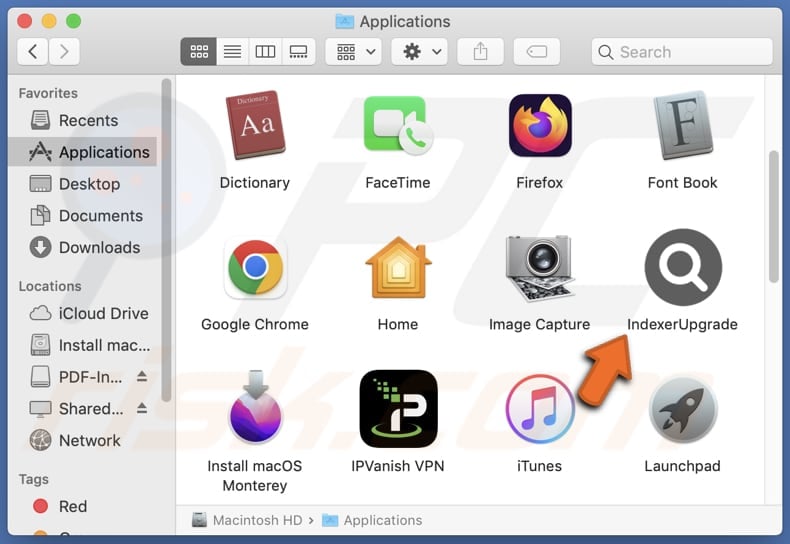
IndexerUpgrade adware in detail
IndexerUpgrade can display a variety of ads ranging from coupons and banners to more intrusive pop-ups. These advertisements may promote shady products, services, or websites, including. Users may encounter fake software updates or system optimization tools, leading to potentially harmful downloads.
Also, IndexerUpgrade may lead to phishing scams, such as fake lottery winnings, fake tech support, or fraudulent offers promising prizes, and malicious websites hosting malware or engaging in drive-by downloads. Moreover, ads from IndexerUpgrade may promote online gambling or adult content websites.
Furthermore, users may encounter dubious online shopping deals or discount offers, often leading to counterfeit or low-quality products. Overall, these ads can redirect users to scam websites or attempt to trick them into downloading malware-infected software, compromising their privacy and security.
Therefore, it is crucial to remove IndexerUpgrade and similar adware applications. Another reason to eliminate adware is that it may monitor users' browsing habits, collect personal information such as names and email addresses, gather system details, track users' locations, and more.
| Name | Ads by IndexerUpgrade |
| Threat Type | Adware, Mac malware, Mac virus |
| Detection Names | Avast (MacOS:Adload-AB [Trj]), Combo Cleaner (Gen:Variant.Adware.MAC.Adload.29), ESET-NOD32 (A Variant Of OSX/Adware.Synataeb.C), Kaspersky (Not-a-virus:HEUR:AdWare.OSX.Adload.g), Full List (VirusTotal) |
| Additional Information | This application belongs to Adload malware family. |
| Symptoms | Your Mac becomes slower than normal, you see unwanted pop-up ads, you are redirected to dubious websites. |
| Distribution methods | Deceptive pop-up ads, free software installers (bundling), torrent file downloads. |
| Damage | Internet browser tracking (potential privacy issues), display of unwanted ads, redirects to dubious websites, loss of private information. |
| Malware Removal (Windows) |
To eliminate possible malware infections, scan your computer with legitimate antivirus software. Our security researchers recommend using Combo Cleaner. Download Combo CleanerTo use full-featured product, you have to purchase a license for Combo Cleaner. 7 days free trial available. Combo Cleaner is owned and operated by RCS LT, the parent company of PCRisk.com. |
More about adware
In conclusion, defined by its intrusive and disruptive advertising tactics, adware seeks to generate revenue for its creators by bombarding users with unwanted advertisements. These advertisements can range from benign nuisances to outright malicious content, posing risks to user privacy and security.
Its presence underscores the importance of maintaining vigilance in online activities and employing robust cybersecurity measures. More examples of adware-type apps similar to IndexerUpgrade are DigitalSystem, SystemLocator, and ServiceCreations.
How did IndexerUpgrade install on my computer?
Adware frequently enters systems when users rush through the installation of free or suspicious software without thoroughly reviewing the process to reject unwanted offers or extra applications. Deceptive websites can also trick users into unknowingly downloading adware.
Obtaining software from unofficial sources like third-party app stores, peer-to-peer networks, or unreliable downloaders can also result in adware installation. Additionally, users might inadvertently install adware by succumbing to phishing emails, fake updates, alerts, and other misleading pop-ups or deceptive ads.
How to avoid installation of unwanted applications?
Stick to downloading apps and files from trusted sources, such as official pages and app stores. Prior to installing any software, meticulously review its reviews. When installing, do not forget to decline any unwanted offers by adjusting the checkboxes or settings in installers.
Maintain your system's security by regularly updating your operating system, web browsers, and installed software to safeguard against potential vulnerabilities. Conduct frequent comprehensive scans on your computer to identify and eliminate any adware or undesired applications. Exercise caution when encountering suspicious ads or pop-ups on questionable websites.
If your computer is already infected with IndexerUpgrade, we recommend running a scan with Combo Cleaner Antivirus for Windows to automatically eliminate this adware.
A message that appears after the installation of IndexerUpgrade:
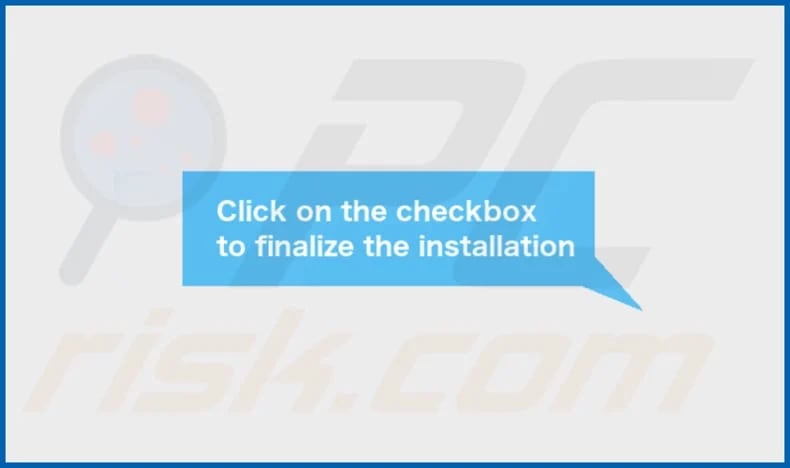
IndexerUpgrade's installation folder:
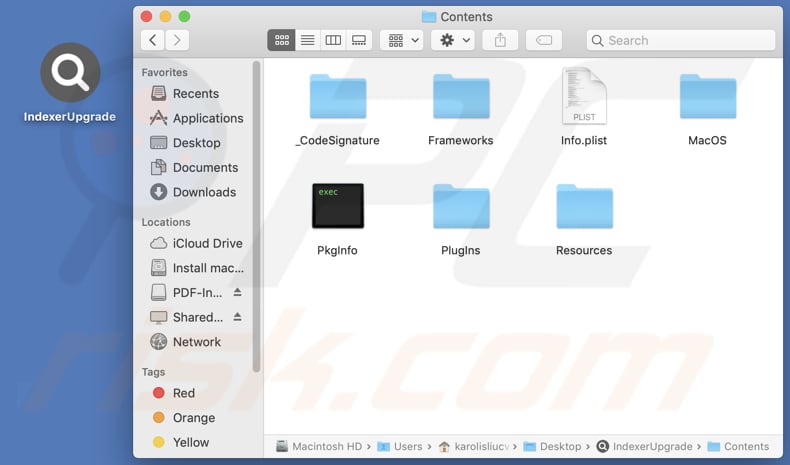
Instant automatic malware removal:
Manual threat removal might be a lengthy and complicated process that requires advanced IT skills. Combo Cleaner is a professional automatic malware removal tool that is recommended to get rid of malware. Download it by clicking the button below:
DOWNLOAD Combo CleanerBy downloading any software listed on this website you agree to our Privacy Policy and Terms of Use. To use full-featured product, you have to purchase a license for Combo Cleaner. 7 days free trial available. Combo Cleaner is owned and operated by RCS LT, the parent company of PCRisk.com.
Quick menu:
- What is IndexerUpgrade?
- STEP 1. Remove IndexerUpgrade related files and folders from OSX.
- STEP 2. Remove IndexerUpgrade ads from Safari.
- STEP 3. Remove IndexerUpgrade adware from Google Chrome.
- STEP 4. Remove IndexerUpgrade ads from Mozilla Firefox.
Video showing how to remove IndexerUpgrade adware using Combo Cleaner:
IndexerUpgrade adware removal:
Remove IndexerUpgrade-related potentially unwanted applications from your "Applications" folder:
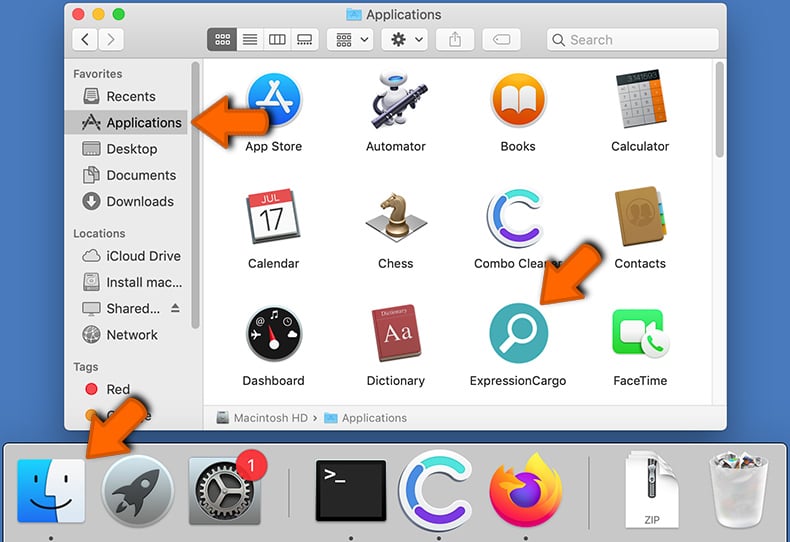
Click the Finder icon. In the Finder window, select "Applications". In the applications folder, look for "MPlayerX", "NicePlayer", or other suspicious applications and drag them to the Trash. After removing the potentially unwanted application(s) that cause online ads, scan your Mac for any remaining unwanted components.
DOWNLOAD remover for malware infections
Combo Cleaner checks if your computer is infected with malware. To use full-featured product, you have to purchase a license for Combo Cleaner. 7 days free trial available. Combo Cleaner is owned and operated by RCS LT, the parent company of PCRisk.com.
Remove adware-related files and folders
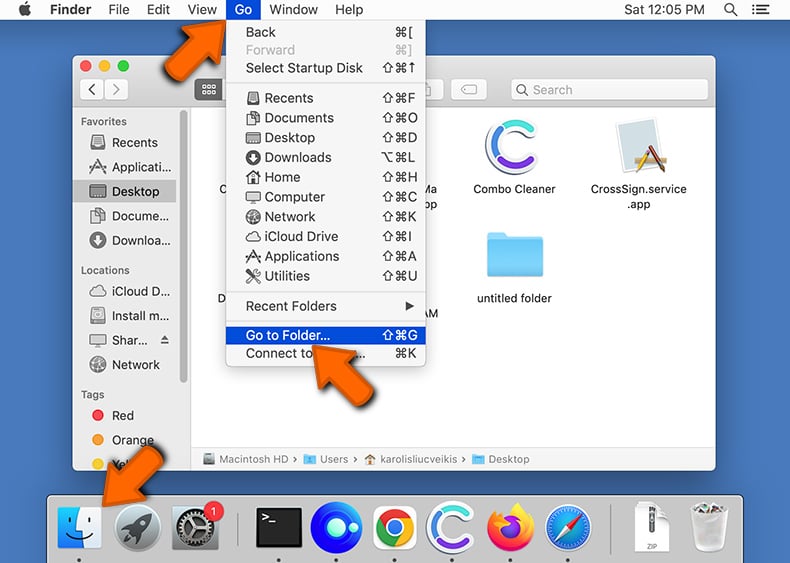
Click the Finder icon, from the menu bar. Choose Go, and click Go to Folder...
 Check for adware generated files in the /Library/LaunchAgents/ folder:
Check for adware generated files in the /Library/LaunchAgents/ folder:
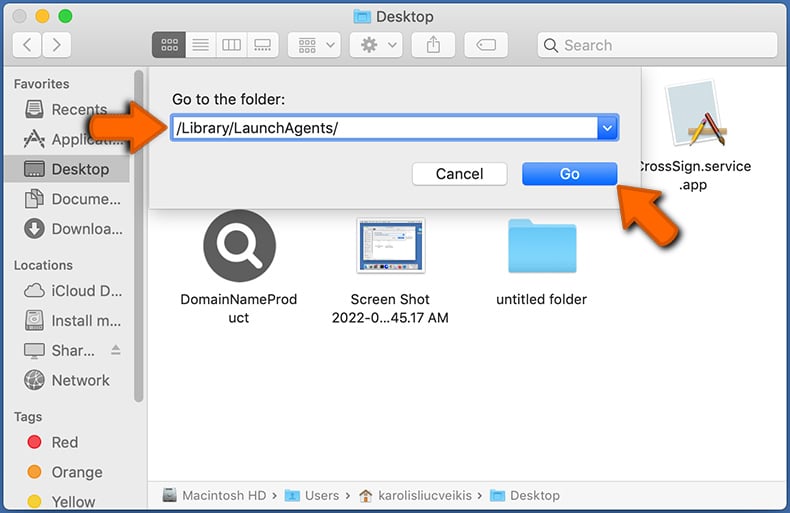
In the Go to Folder... bar, type: /Library/LaunchAgents/
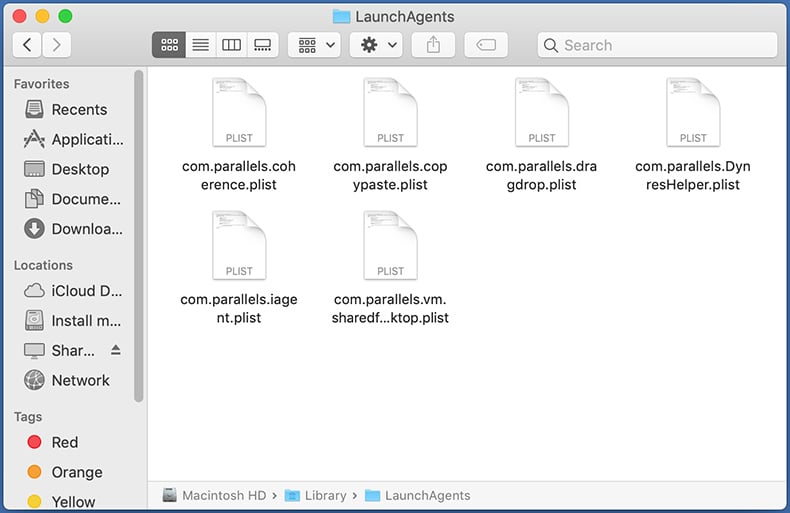
In the "LaunchAgents" folder, look for any recently-added suspicious files and move them to the Trash. Examples of files generated by adware - "installmac.AppRemoval.plist", "myppes.download.plist", "mykotlerino.ltvbit.plist", "kuklorest.update.plist", etc. Adware commonly installs several files with the exact same string.
 Check for adware generated files in the ~/Library/Application Support/ folder:
Check for adware generated files in the ~/Library/Application Support/ folder:
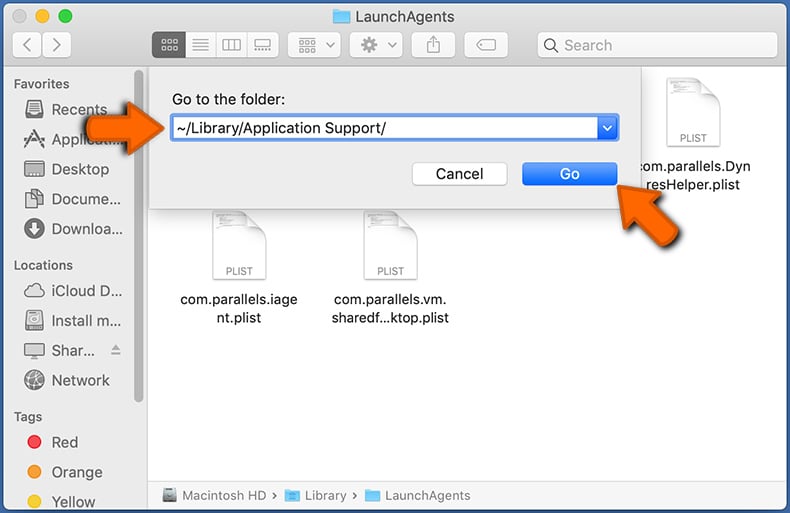
In the Go to Folder... bar, type: ~/Library/Application Support/
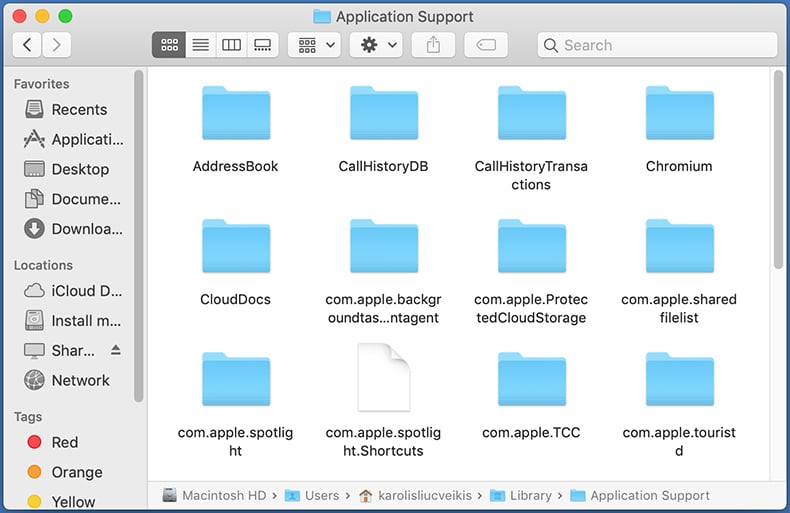
In the "Application Support" folder, look for any recently-added suspicious folders. For example, "MplayerX" or "NicePlayer", and move these folders to the Trash.
 Check for adware generated files in the ~/Library/LaunchAgents/ folder:
Check for adware generated files in the ~/Library/LaunchAgents/ folder:
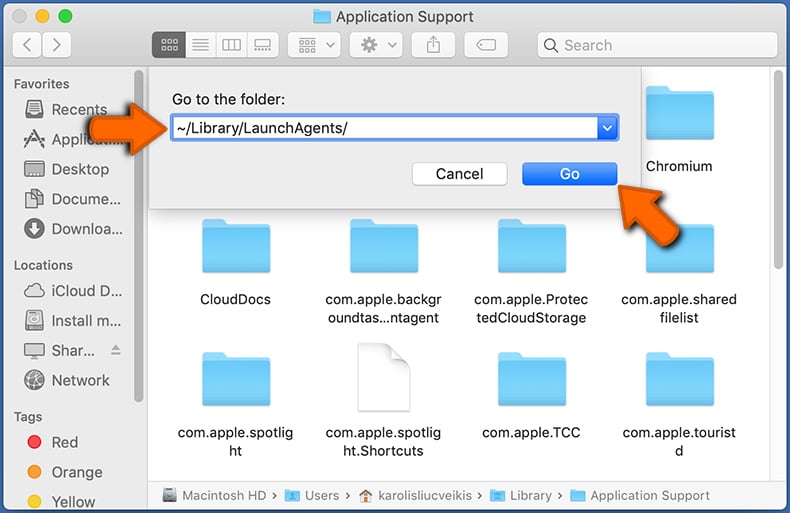
In the Go to Folder... bar, type: ~/Library/LaunchAgents/
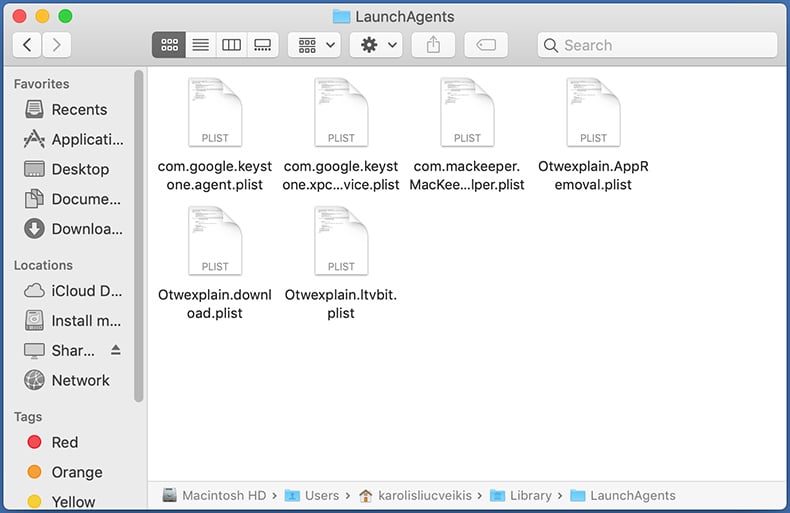
In the "LaunchAgents" folder, look for any recently-added suspicious files and move them to the Trash. Examples of files generated by adware - "installmac.AppRemoval.plist", "myppes.download.plist", "mykotlerino.ltvbit.plist", "kuklorest.update.plist", etc. Adware commonly installs several files with the exact same string.
 Check for adware generated files in the /Library/LaunchDaemons/ folder:
Check for adware generated files in the /Library/LaunchDaemons/ folder:
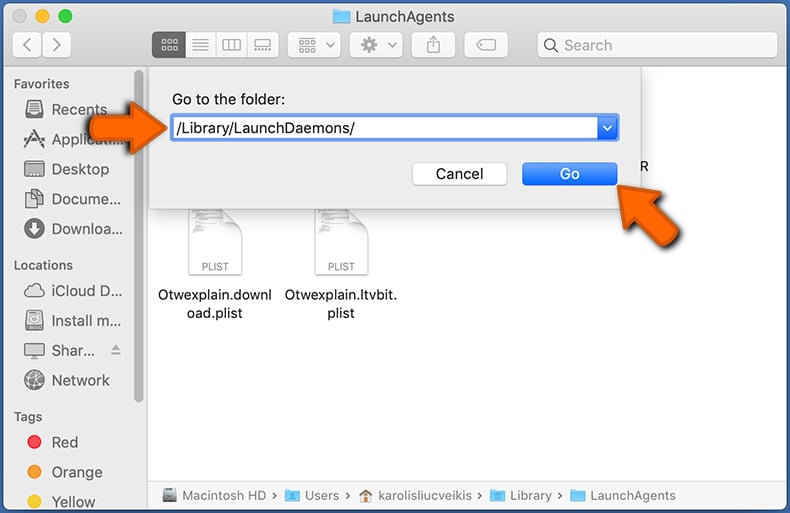
In the "Go to Folder..." bar, type: /Library/LaunchDaemons/
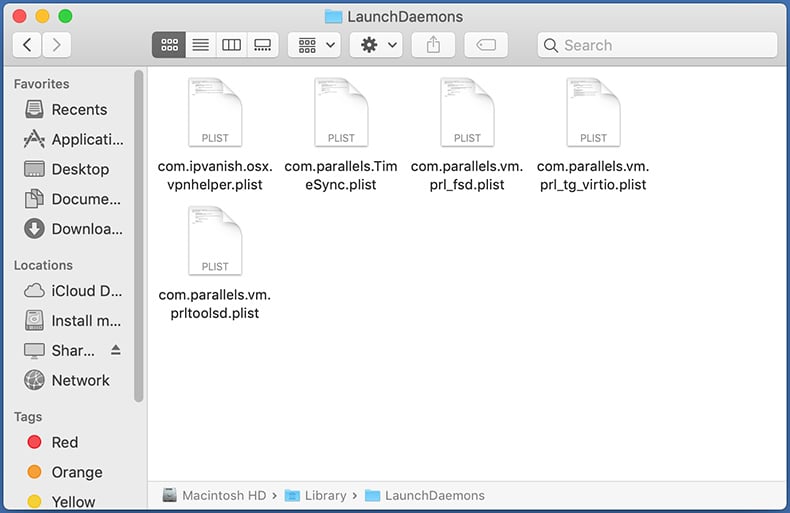
In the "LaunchDaemons" folder, look for recently-added suspicious files. For example "com.aoudad.net-preferences.plist", "com.myppes.net-preferences.plist", "com.kuklorest.net-preferences.plist", "com.avickUpd.plist", etc., and move them to the Trash.
 Scan your Mac with Combo Cleaner:
Scan your Mac with Combo Cleaner:
If you have followed all the steps correctly, your Mac should be clean of infections. To ensure your system is not infected, run a scan with Combo Cleaner Antivirus. Download it HERE. After downloading the file, double click combocleaner.dmg installer. In the opened window, drag and drop the Combo Cleaner icon on top of the Applications icon. Now open your launchpad and click on the Combo Cleaner icon. Wait until Combo Cleaner updates its virus definition database and click the "Start Combo Scan" button.
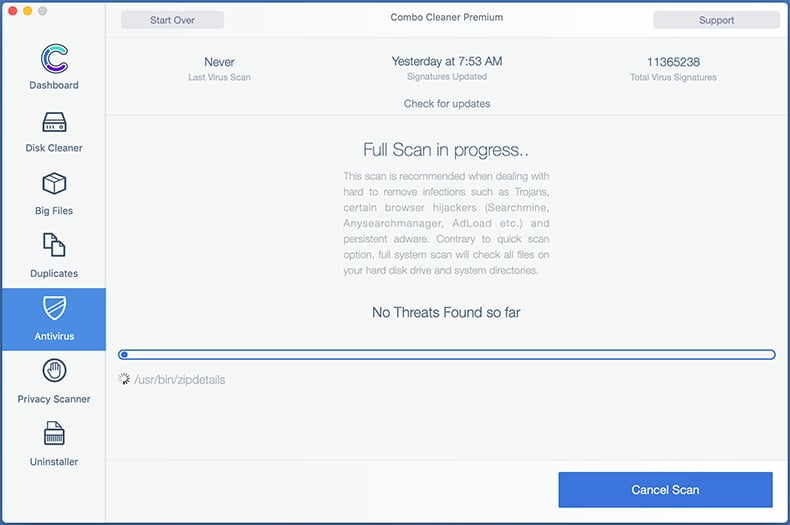
Combo Cleaner will scan your Mac for malware infections. If the antivirus scan displays "no threats found" - this means that you can continue with the removal guide; otherwise, it's recommended to remove any found infections before continuing.
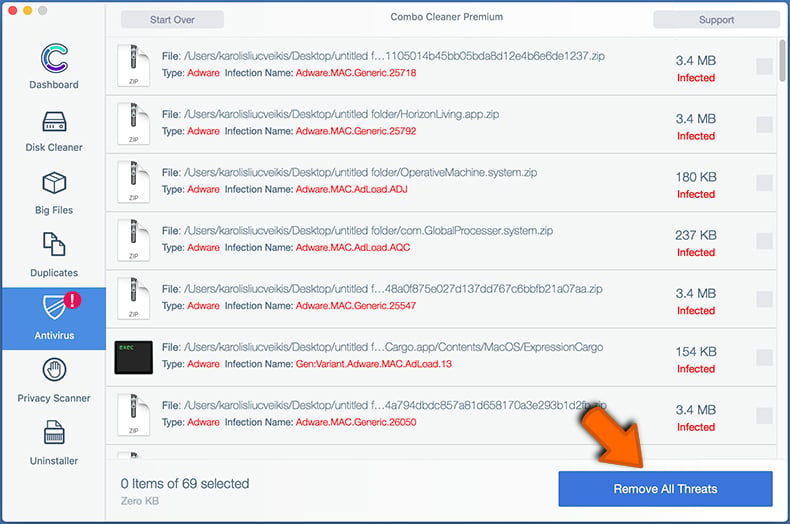
After removing files and folders generated by the adware, continue to remove rogue extensions from your Internet browsers.
Remove malicious extensions from Internet browsers
 Remove malicious Safari extensions:
Remove malicious Safari extensions:
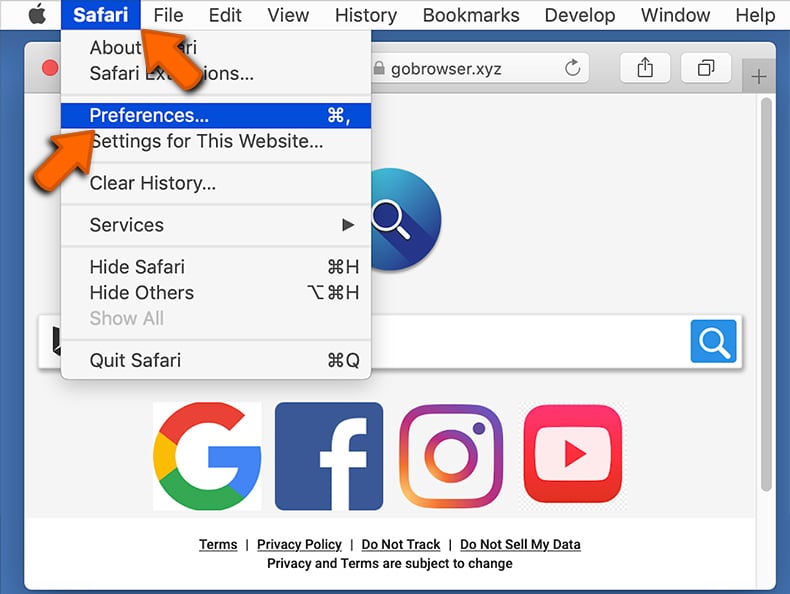
Open the Safari browser, from the menu bar, select "Safari" and click "Preferences...".
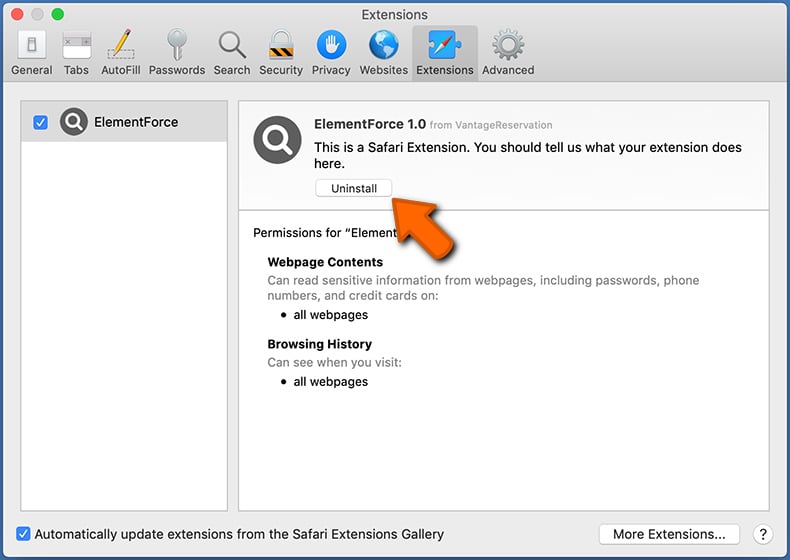
In the preferences window, select "Extensions" and look for any recently-installed suspicious extensions. When located, click the "Uninstall" button next to it/them. Note that you can safely uninstall all extensions from your Safari browser - none are crucial for regular browser operation.
- If you continue to have problems with browser redirects and unwanted advertisements - Reset Safari.
 Remove malicious extensions from Google Chrome:
Remove malicious extensions from Google Chrome:
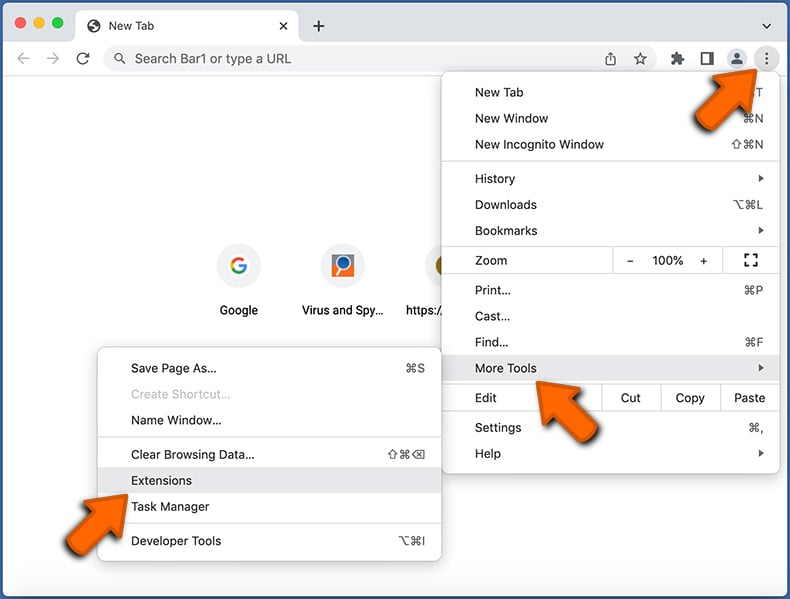
Click the Chrome menu icon ![]() (at the top right corner of Google Chrome), select "More Tools" and click "Extensions". Locate all recently-installed suspicious extensions, select these entries and click "Remove".
(at the top right corner of Google Chrome), select "More Tools" and click "Extensions". Locate all recently-installed suspicious extensions, select these entries and click "Remove".
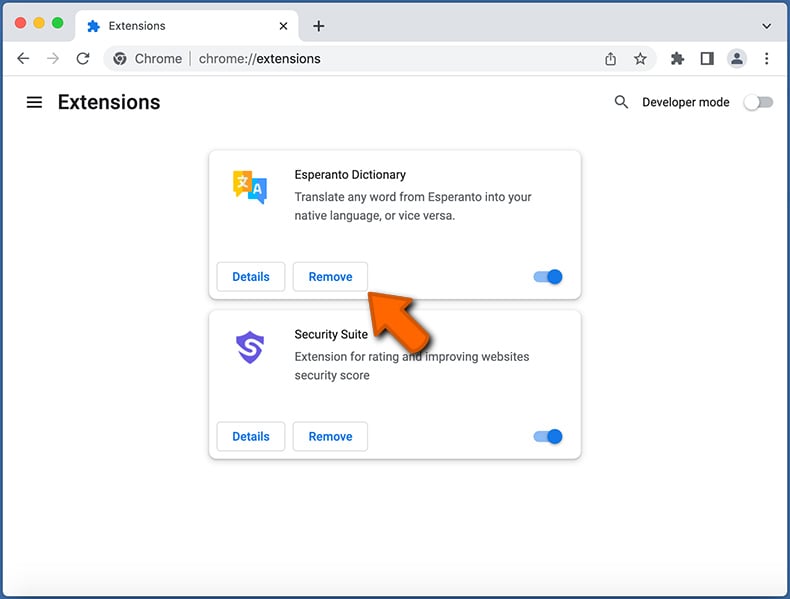
- If you continue to have problems with browser redirects and unwanted advertisements - Reset Google Chrome.
 Remove malicious extensions from Mozilla Firefox:
Remove malicious extensions from Mozilla Firefox:
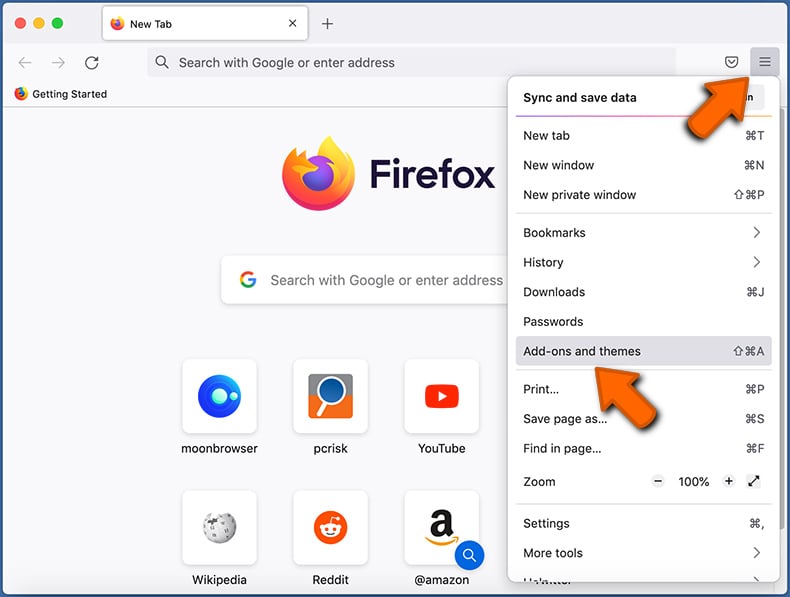
Click the Firefox menu ![]() (at the top right corner of the main window) and select "Add-ons and themes". Click "Extensions", in the opened window locate all recently-installed suspicious extensions, click on the three dots and then click "Remove".
(at the top right corner of the main window) and select "Add-ons and themes". Click "Extensions", in the opened window locate all recently-installed suspicious extensions, click on the three dots and then click "Remove".
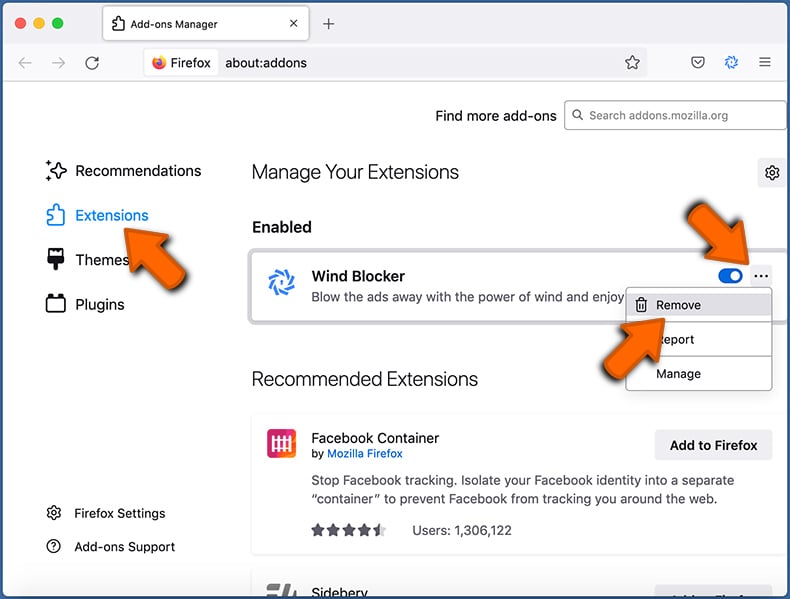
- If you continue to have problems with browser redirects and unwanted advertisements - Reset Mozilla Firefox.
Frequently Asked Questions (FAQ)
What harm can adware cause?
Adware has the potential to be disruptive, causing annoyance and interrupting browsing experiences with intrusive advertisements. Additionally, it can lead to decreased computer performance and may compromise user privacy by gathering data.
What does adware do?
Adware floods users with intrusive ads and, at times, seizes control of browsers and (or) gathers various information.
How do adware developers generate revenue?
Adware developers make money by advertising products, websites, or services through affiliate programs. In this arrangement, developers earn commissions when users click on their ads and make purchases or engage with the promoted content.
Will Combo Cleaner remove IndexerUpgrade adware?
Combo Cleaner effectively scans computers and eradicates adware-type applications. However, it is important to note that manual removal might not completely eliminate all traces, as certain files could remain hidden. Therefore, it is recommended to utilize Combo Cleaner for thorough removal.
Share:

Tomas Meskauskas
Expert security researcher, professional malware analyst
I am passionate about computer security and technology. I have an experience of over 10 years working in various companies related to computer technical issue solving and Internet security. I have been working as an author and editor for pcrisk.com since 2010. Follow me on Twitter and LinkedIn to stay informed about the latest online security threats.
PCrisk security portal is brought by a company RCS LT.
Joined forces of security researchers help educate computer users about the latest online security threats. More information about the company RCS LT.
Our malware removal guides are free. However, if you want to support us you can send us a donation.
DonatePCrisk security portal is brought by a company RCS LT.
Joined forces of security researchers help educate computer users about the latest online security threats. More information about the company RCS LT.
Our malware removal guides are free. However, if you want to support us you can send us a donation.
Donate
▼ Show Discussion